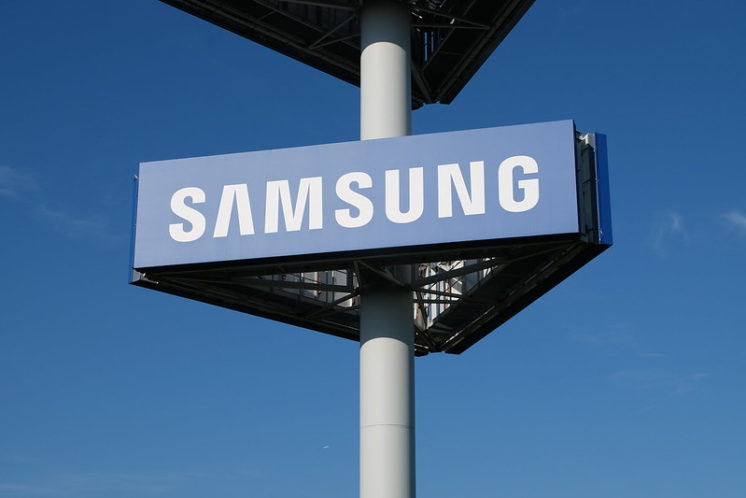Samsung refused to inform workers about the chemicals used in its factories, chemicals that possibly led to the illness and death of more than 600 workers. The case illustrates how corporations can prioritise trade secrets over workers’ safety; and how they refuse to disclose crucial information needed to hold them to account in the event of harm is taking place.
 Photo: Flickr
Photo: FlickrIn 2007, family members of Samsung workers began to look into the chemicals used in Samsung factories, suspecting that these were the cause of illnesses suffered by their loved ones. [1] Indeed, by 2017, the worker safety group Banolim, known in English as SHARPS, had counted more than 200 cases of serious illnesses suffered by workers in the Samsung factories, by 2019 616 cases had been documented. The injuries included leukaemia, lupus, lymphoma and multiple sclerosis. These illnesses cost the lives of not less than 185 workers according to SHARPS. Most workers were in their 20s and 30s.[2]
When family members of Samsung workers asked to know what chemicals their loved-ones had been exposed to when working for Samsung, the government could only provide documents that featured blank spaces where the used chemicals should have been featured.[3] The South Korean authorities justified their decision to withhold information in at least six cases by saying that the information touched upon ‘trade secrets’.[4]
The law on occupational disease compensation would oblige any corporation to provide information to its workers about the chemicals present and used within its factories. However, government officials openly stated that Samsung’s corporate interests were more important than the workers’ demands; that evaluating trade secret claims is difficult; and that they feared being the target of a lawsuit filed by Samsung for sharing data against the company’s will.[5]
In a letter to regulators, Samsung said that if data, including “types and volumes of substances”, was released for one of the compensation demands filed by a worker, “it is feared that the technology gap with rivals at home and overseas would be reduced and our company’s competitiveness would be lowered. For that reason they are trade secrets that we treat strictly as secrets, we request not to disclose.”[6]
Samsung has strongly denied that it has “intentionally blocked workers from accessing chemical information pertaining to workplace health and safety, or illegally prevented the disclosure of such information”.[7] Nevertheless, in 2017, the South Korean Supreme Court recognised Samsung’s refusal to provide information about workplace conditions, and decided the resulting lack of evidence should be considered in favour of the workers harmful exposure to hazardous chemicals within Samsung factories.[8]
Samsung proudly discloses its commitment to human rights and its self-proclaimed status as “one of the most ethical companies in the world”.[9] However, the gap between this marketing image and the reality in its factories has been the subject of a lawsuit brought by Sherpa and ActionAid France in France in January 2018. The lawsuit, which uses consumer law and the cause of action known as ‘misleading advertising’, alleges that Samsung’s claims to ethical business practices are misleading to French consumers of its products. In April 2019, the argument was accepted by the investigating judge and Samsung France came under investigation for misleading advertising. This opens up the possibility that Samsung France will be sent to trial once the investigation is completed (misleading advertising is a criminal offence in France, unlike in other jurisdictions).[10]
In July 2018, Samsung and SHARPS (representing the sick workers and family of the deceased) reached a mediated settlement agreement which included a public apology for the deaths of the workers and a financial compensation package.[11] This was a development welcomed by the OHCHR Special Rapporteur on the implications for human rights of the environmentally sound management and disposal of hazardous substances and wastes.[12] At the same time, Samsung maintains the position that the causal relationship between the workplace environment and the contracted illnesses remains unclear.[13]
The case illustrates how a company might prioritise trade secrets over workers’ safety or the environment, to the point of refusing information that could in fact help to save lives, as well as preventing and mitigating serious forms of harm. The non-disclosure of crucial information complicates efforts by victims and advocates to obtain redress and to hold the company to account, thereby helping them to evade liability.
[1] Youkyung Lee, “2 words keep sick Samsung workers from data: trade secrets,” AP NEWS, August 11, 2016, https://apnews.com/ea1b8280b50b4ad3a9bdcd9def798914 (accessed November 5, 2019); “Samsung denies withholding information on toxins from workers,” BBC News, August 11, 2016, https://www.bbc.com/news/business-37042199 (accessed November 5, 2019).
[2] Lee; “More than 100 Occupational Disease Victims of Samsung Likely Remain Uncompensated,” Stop Samsung, blog, March 5, 2019, https://stopsamsung.wordpress.com/2019/03/05/more-than-100-occupational-disease-victims-of-samsung-likely-remain-uncompensated/ (accessed November 5, 2019).
[3] Lee; The Associated Press, “Samsung linked to worker’s rare disease, court says,” CBS News, August 30, 2017, https://www.cbsnews.com/news/samsung-linked-to-workers-rare-disease-court-says/ (accessed November 5, 2019).
[4] Lee.
[5] Lee.
[6] Lee.
[7] Samsung Newsroom. “Statement on the Associated Press Article of August 10, 2016,” August 10, 2016. https://news.samsung.com/global/statement-on-the-associated-press-article-of-august-10-2016. (accessed June 4, 2020); Samsung Newsroom. “Additional Information Regarding the Associated Press Article of August 10, 2016,” August 13, 2020. https://news.samsung.com/global/additional-information-regarding-the-associated-press-article-of-august-10-2016.
[8] The Associated Press.
[9] Samsung, “Philosophy: Five Samsung Business Principles,” https://www.samsung.com/levant/aboutsamsung/vision/philosophy/business-principles/ (accessed November 5, 2019).
[10] Sherpa, “Samsung’s indictment in France: fighting transnational corporations’ human rights’ violations through consumer law,” The Freedom Fund, blog, August 30, 2019, https://freedomfund.org/blog/samsungs-indictment-in-france-fighting-transnational-corporations-human-rights-violations-through-consumer-law/ (accessed November 5, 2019).
[11] Samsung. “Samsung Electronics and SHARPS Accepts Settlement Plan,” November 30, 2018. https://www.samsung.com/semiconductor/minisite/EHS/resource/materials/17-settlement/. (accessed June 4, 2020); CNBC. “Samsung Apologizes over Sicknesses, Deaths of Some Workers,” November 23, 2018. https://www.cnbc.com/2018/11/23/samsung-apologizes-over-sicknesses-deaths-of-some-workers.html (accessed June 4, 2020); Sherpa.
[12] United Nations Office of the High Commissioner for Human Rights. “Samsung Decision to Compensate Sick Electronics Workers Welcomed by UN Expert, Urging Action by All Firms.” https://www.ohchr.org/EN/NewsEvents/Pages/DisplayNews.aspx?NewsID=23476&LangID=E. (accessed June 4, 2020)
[13] Samsung 2018; Wan Kim and Jae-yeon Lee, “Worked to death at the ripe age of 22,” Hankyoreh, June 23, 2019, (accessed November 5, 2019).
